
Dave951
-
Posts
10 -
Joined
-
Last visited
Content Type
Profiles
Forums
Articles
Store
Posts posted by Dave951
-
-
17 hours ago, livitup said:
Which course are you offering? I'm going through the process in getting NRA instructor certified in shotgun, but as I understand it, there's a total of 30 hours of training between Discipline Basic, Instructor Basic, and Discipline Instructor. How long is your course?
Just thinking out loud... would you have better luck recruiting black powder enthusiasts to become instructor certified than you would have with recruiting Scouters to become black powder instructors?
Thanks for the reply. We're going to offer the entire 3 courses starting with Basic Muzzleloading on 10/9 at Camp Raven Knob. The next two will be on the weekend of 11/20 and last all day Saturday and Sunday, also at CRK. The process as you've outlined is correct for a single discipline like Rifle. In the world of Muzzleloading, it's different. First is Basic Muzzleloading and it will cover safety, history and how to load and shoot BP rifles, handguns, and shotguns. In short, it covers 3 guns where the other courses cover only one. The Basic Instructor Training is the same for every discipline. It's learning how to teach. The Muzzleloading Instructor Course has a shooting qualification component for Rifle, Pistol AND Shotgun. Again, 3 different guns to deal with. No other course has this. In addition to the issues of 3 different arms, then there's the entire issue of dealing with Black Powder and the different types of loading procedures for the different types of guns. It can get quite complicated and somewhat overwhelming to the new instructor who isn't a Black Powder enthusiast.
As to where to get instructor candidates, I'll fish in any pond that might have fish in it. Ideally I'd like Scouters to be the instructors as they are already "inside" Scouting and familiar with it. I'm also working to get folks involved from outside who are BP enthusiasts. Our current group has been told by a Scouter who has National connections in the Shooting Sports that we are extremely rare not only in the world of instructors, but especially in the world of instructors working in Scouting because we are all active BP competition shooters. In the current class enrollment, I have folks from both worlds. It's interesting to see the reaction of the guys who've never been involved in Scouting when they get involved with us in this way. Conversely, the Scouters I have signed up thus far are not "gun guys" when it comes to Black Powder. The mix will be interesting and I'm sure there will be some synergy between the groups. On the current Scouters in BP, I've heard enough horror stories about the "shake n bake" so called "instructors" from camp school to be concerned that there will be an accident at some point. Couple that sketchy knowledge with a lack of enthusiasm and you have a recipe for a program failure. When it comes to adults in Scouting or working with kids in general, the real issue is the same across all demographics. It's not easy getting folks to get involved with youth. Lots of people talk a good game, but when it comes time to do something, they'll leave it to somebody else. I know, I was an Asst. Scoutmaster for about 10yr. Hey, it's only 1 night a week........yeah, about that.
-
To work in Scouting muzzleloading, you must hold the NRA Muzzleloading Instructor Certification. Some of you got it at camp school but I bet my last dollar on my dying breath you did not get the education you really need to be effective. A group of us black powder competition shooters have gotten the certification. We've seen "instructors" who were shake n baked at camp school. To have a truly effective, fun and safe program, the instructor must be extremely knowledgeable and enthusiastic about the subject and that's probably not happening in a day at camp school. So our group is organized not only around providing quality instruction when we come to a camp but we're also focused on training the best instructors possible. So here's our announcement for a training session to be held at Camp Raven Knob in NC.
Time is getting near for the Basic Muzzleloading Class to be held at Camp Raven Knob in NC by the Yadkin Valley Rangers.
To become a NRA certified Muzzleloading Instructor, you must complete 3 classes- Basic Muzzleloading, Basic Instructor, Muzzleloading Instructor. There is no shortcut to this certification, hence it's not a commonly found one. If you want to ever work with most youth organizations in black powder, you must have this certification. I can't stress enough how important it is for adults to get involved with kids. Many on this and other black powder boards whine about the status of our sport, but the real question is what do you plan to do about it?
Even if you are already a long time muzzleloading/black powder person, you still have to go through the courses to be certified. The course is interesting, shooting is fun, and you'll meet other black powder enthusiasts and have opportunities to network you would otherwise not have.
Please reply by email as time is getting short and we have logistics to get settled soon.
Course Date/Time- 10/9 at 8a
Email- YadkinValleyRangers@gmail.com
Place- Camp Raven Knob, NC https://www.ravenknob.com/
Duration- 1 day
Cost- $60 NMLRA members $85 non NMLRA members
included in the cost- free lodging at Camp Raven Knob on Friday night for those having to travel. Lunch and refreshments on Saturday. Ammo and course materials. For non-NMLRA members also will receive a 1 year digital membership to the NMLRA.
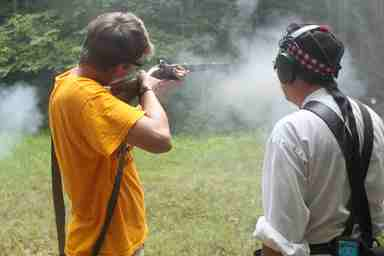
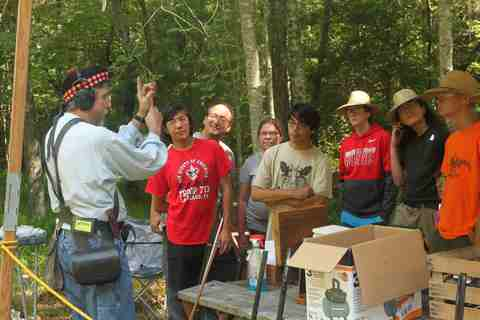
-
 1
1
-
-
I've spent two summers now volunteering as a Muzzleloading Instructor in a couple camps and this is how I see the state of affairs.
First off, certified Muzzleloading Instructors are a rare bunch. Of those I've seen, only those in my little corner of muzzleloading instructors were actual muzzleloading enthusiasts and/or competitors. How in the hockey sticks do you think a Scout will think this is fun if the instructor isn't into it? Kids aren't dumb. They can see right through you given some time. So did you get the cert just to get the job? How exactly is that going to benefit the Scout? I've seen some "instructors" for muzzleloading that well.... were just plain uneducated and didn't know it.
Second, muzzleloading is often given the short shrift. Many shooters look down their noses at it because they've never, ever been involved with anything past a few shots with a patch round ball at a frankly, boring range session. This mainly because of a severe lack of knowledge of the black powder shooting sports world. Muzzleloading opens up an entire section of history that Scouting is designed around, namely Native American activities and Mountain Man lifestyle. Many handcraft activities directly interface with muzzleloading.
Third, because of 1&2, it's a recipe for failure or stagnation of a program. Sad but all too true.
We're working on creating a program that can be replicated by any camp with a shooting sports program that is serious about having a black powder program that Scouts will be on a waiting list to enjoy. Thus far, at our sessions, we start off with a safety brief. We then move into a short history lesson of black powder arms and we bring examples for "show n tell". We let the Scouts handle these arms even though policy will not let them shoot them. In that case we often do firing demonstrations. Imagine a Scout at a "normal" black powder session, here's the camp gun, let's load and maybe shoot a bit. At ours, here's the camp gun, but here's it's family tree going back hundreds of years and yeah, we don't mind if you touch. They never seem to tire of handling an 1863 Sharps, 1863 Remington Contract, 1869 Rolling Block, 1700s Brown Bess, or 1840s Hawken. Then it's on to shooting. We start out with Patch Round Ball in the camp guns. We get them onto a paper plate at 25yd first. Most "instructors" think that's good, but we use that as a spring board to better things. Because our group hails from a Civil War competition group, we have muskets set up and dialed in for them to shoot. Relay follows relay follows relay. Targets get smaller and more challenging as we coach on marksmanship with musketry and minie balls. By the end of the day, each Scout may well have fired over 25-30 shots and you won't do that with patch round ball. We don't insist on what guns to shoot, they can choose from what's on the rack, but the muskets are always the hot ticket. Scouts love reactive targets. Watching an apple get vaporized by a 58cal musket hit is pretty cool. Learning to split a playing card is cool. In short, punching paper, while it has it's place, is boring. Being a Civil War competition group, we sometimes let the Scouts do volley fire just like a battle line. So far that's been wildly popular as a 2ft square piece of drywall gets massively perforated by musket fire.
As we see it, for a program to be successful, Scouts must be constantly, actively involved in a fun and safe activity. With that in mind, how could a camp replicate our pilot program (which is constantly being developed). To that end, we're designing a minie bullet that can be loaded and used in camp guns just like the minies in the muskets we bring. With this bullet, Scouts can load and fire on the line much more than with a round ball. Said bullet will hopefully be accurate enough for use in gallery type shooting like what camps offer. If this design pans out, then any camp with a dedicated group of enthusiastic, knowledgeable instructors can have a great program using the 50cal guns most camps have using this bullet and our method of instruction. The key to using a minie is knowing how it was designed to work. Our instructor training program covers that exact topic. You won't find it at any other instructional/educational setting because they AREN'T CONDUCTED BY competition shooters.
Bottom line, black powder shooting sports in Scouting suffer from a lack of enthusiastic, knowledgeable instructors. We're working to change that but it won't happen if adult leaders and Scouters don't step up and get their nails dirty shooting the "stinky" guns and Scouts will miss out on a really fun time on the range with historic rifles.
-
 1
1
-
-
43 minutes ago, David CO said:
Good idea using modern-day saltines. It might not be able to penetrate hardtack.

Saltine is a smaller target. Ritz at 25yd presents about the same aspect ratio as an 8moa black. Hardtack is way too easy. They're more fun at 100yd with the howitzer.
-
10 hours ago, David CO said:
Don't know if Stosh is still lurking about. I believe he was into Civil War reenactments. Must know a thing or two about black powder muskets.
Do scouts use round shot or Minie balls?
I like the Hall rifle. unusual weapon. Sort of a cross between a breach loader and a muzzle loader.
So far, all our instructors are North South Skirmish Association competitors and we are quite well versed in minie ball accuracy. We aren't reenactors, we shoot live ammunition for score, including artillery. I can personally vouch for that as I'm on a 6lb rifled howitzer crew. In our effort, we have donated powder and caps from Schuetzen. We had 5 muskets donated to augment our own collections of muzzleloaders. There are a couple of "sutlers" who cater to the Civil War small arms collector and competitor who provide logistic support to keep those muskets running. One of our members does presentations with various Civil War groups and receives an honorarium which goes to purchase lead which we cast into minies and some round ball.
So a brief run down on how we conduct our sessions. A day is generally divided into morning and afternoon with 2 sessions per. In each session, there will generally be at least 2 "relays" of live fire sometimes more. We flex this general plan around to get the most time on the firing line for the Scouts. First and foremost a safety brief with range commands. Then we move into a short history lesson with lots of cool "show n tell" with everything from flintlocks all the way to the last muzzleloading guns in common use, namely the Civil War. We then get to the meat of the session, live fire with standard patch round ball guns. We have the Scouts fire a number of shots with those and then we move on to the muskets. The muskets we use are 1863 Remington Contracts aka "Zouave". All the time the Scouts are there, we are teaching constantly but they don't know it. First they learn safety, loading and shooting accurately with patch round ball. Then we move into using minies and muskets and repeat safety loading and marksmanship. The benefit of the minie system is that wiping between shots isn't necessary meaning far more time shooting. We also change the loading procedure from the "loading table" with the patch round ball guns, to loading on the line in the presence of an instructor. The instructor holds the ammunition supply on his person in a cartridge box which the kids think is way cool. The instructor will issue one round to the Scout who loads. The instructor will then issue one cap for the Scout to put on the gun. All the time, the instructor is very close to monitor the procedure for safety and to take control of the gun if necessary. All the time the Scouts are shooting, we're working on their marksmanship (we're competition shooters after all!). By the end of the day, most Scouts can pick off a Saltine cracker hanging on a string at 25yd with a Civil War musket. Last item of the day is volley fire. The Scouts are taught a modified version of Civil War drill and will fire at a 2ft square piece of drywall in a volley. They love watching the drywall dust fly as the minies riddle the sheetrock.
So we have patch round ball v minie. The issue we've found with using minies, is that unless you shoot them all the time and truly understand how to use them, they'll be a problem. Since that's what we shoot all the time, we know minies pretty thoroughly. The issue with using a minie in a 50cal camp gun is rifling. Most conventional muzzleloading guns aren't set up for minies and the minie molds that are available for a 50cal don't take the rifling issue into account. Well, we've designed a minie that should work just fine in a Scouting setting in a 50cal gun. The mold is being cut as this is being written and we'll test it as soon as possible. If it works, then we can shoot minies in any 50cal gun available. Will it make a target rifle from a craptastic plastic camp gun? Probably not, but if it's stable to 50yd with good accuracy, then we have a winning design that can be used by instructor who is willing to learn the minie system.
What this brings us to is how to make a successful muzzleloading program. Scouts love to shoot and Scouts today have notoriously short attention spans. That doesn't usually work too well in round ball muzzleloading. What we're trying to do is solve the issue of the instructor shortage, increase the throughput of youth of a camp program to impact the maximum number of Scouts possible and design a program that can be utilized in as many camps as possible with the resources at hand. We feel that our unique experience in muzzleloading competition gives us insight into solutions that can be taught and implemented by those willing to work. Having been in Scouting I recognize that there are some politics endemic to Scouting but guys, we have to drop the politics and understand the goal is working with the kids. Your Wood Badge doesn't mean squat if you don't use it to benefit the maximum number of Scouts you can in any camp at any time. That's my soapbox and I'll gladly stand on it.
Here one round of ammunition has just been issued to the Scout who has loaded his musket. He's about to be issued a cap and then will fire. What the Scout doesn't realize is that he's being coached on his marksmanship at the same time. On this particular session, he was the first to nail a Saltine with a musket.
And the results of volley fire. The kids had a ball repelling the drywall horde led the by the infamous Col Mustard. The mustard pack seems to make it's way onto many of our target materials. Apples vaporize pretty well with a minie too. The young man in the Federal uniform is a Scout that was attending camp that summer and heard he would get to shoot Civil War muskets. He's interested in reenacting and now has quite the story to tell.
-
 1
1
-
-
Here's a couple pix from the range-
The day starts with a safety brief and a quick history lesson
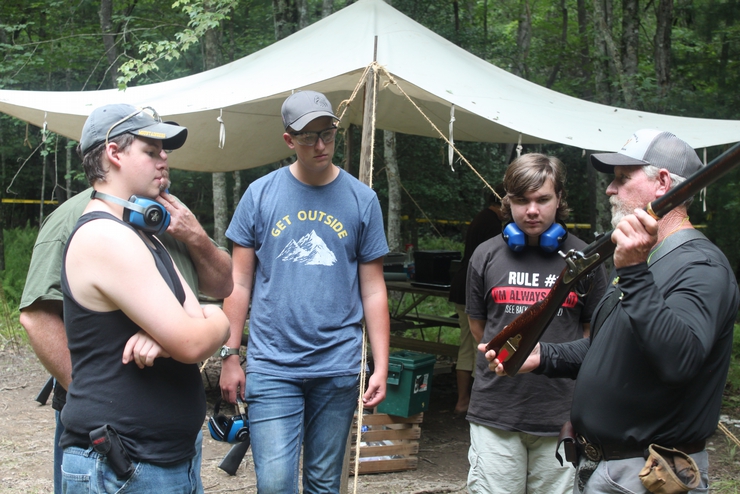
Then on to the fun part
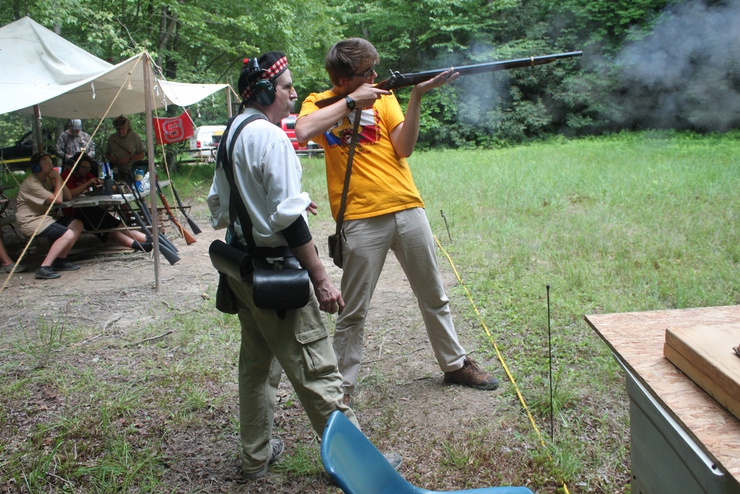
Best shot of the summer at Camp Raven Knob that year, an 11yo daughter of a Scoutmaster
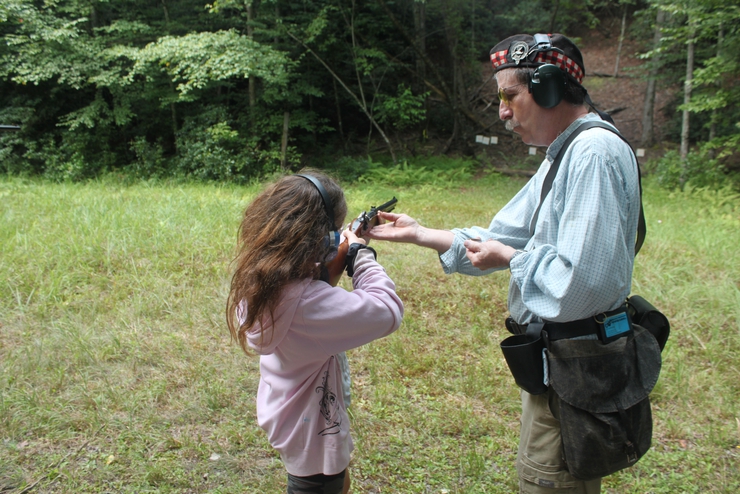
Evenings that first year were an open shoot at the main range back in the camp. Lots of ammo expended, much fun was had by the Scouts.
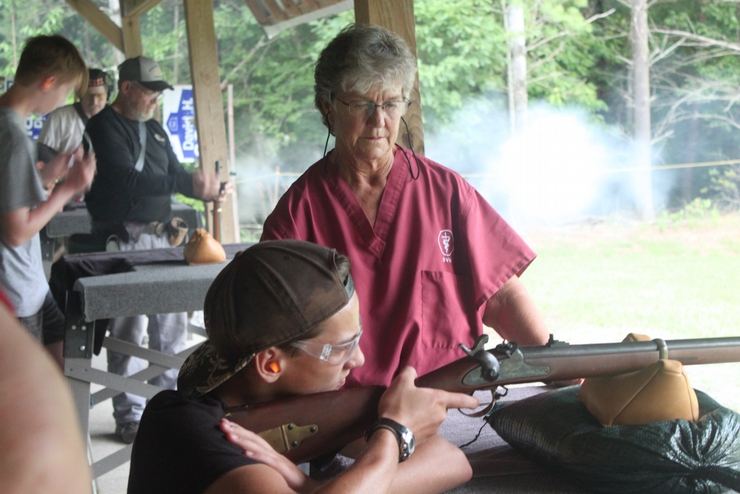
-
 1
1
-
 1
1
-
-
I started my involvement with BSA back in the late 60s with Troop 134 in Charlotte, NC. The troop fell apart, I found the "fumes" and went my way, but later my dad (our Asst Scoutmaster) told me the real reason the troop failed- adults not committed to the future of the kids. So as my sons became old enough to get into Scouting, I got involved right with them with Troop 415 Old Hickory Council in NC. They made Eagle, one with palms. Of their friends in the troop, all of them made Eagle. Each of those young men has had amazing lives as adults in their career fields. The reason, we had a cadre of seriously involved adults that made sure that the program had the support for the kids to succeed whether as a Scoutmaster, Asst Scoutmaster or just a dad or mom who cared.
Fast forward to recent times. My sons are 20 years removed from Scouting but we still talk about those days. I was having dinner in a local restaurant when a big guy carrying a small baby came up and addressed me by name. I didn't recognize him till he told me his name. The years melted away and then instead of a big grown man, under the beard and adult eyes, I again saw the boy. Last time I saw him, he was being awarded Eagle and it seemed as if it was yesterday we last saw each other as we talked about Scouting. The part that really hit me was his appreciation of what we did for the troop back in the day. Now this young man and his young family are going to get involved in a troop as soon as the tyke is old enough.
So to my point. I make no apologies for being a competition shooter. But recently, I've found that Scouting has a shortage of qualified, certified instructors in muzzle loading shooting sports and that's my competition of choice. A while back, I was discussing the shortage of volunteers in muzzle loading in Scouting with some fellow competitors and we decided to do something about it to help Scouting. We got certified, we secured support, we put in the time at Camp Raven Knob in the Mountain Man program, namely, muzzle loading. It was a huge success. We recently resumed our activities last summer in both Camp Bud Shiele and Camp Raven Knob in working with Scouts in muzzle loading. We formed a Charter Club within the National Muzzle Loading Rifle Association whose focus is on education and instruction. Through the summer, it has become very clear, that the shortage of certified instructors in muzzle loading has only become worse. Had we not been available, neither camp would have had a muzzle loading program at all. Our charter club is a finite number of people, we need more adults and Scout leaders to get certified to pitch in, whether it's with us or at another camp, the point is to have a safe, fun program for Scouts to participate in. So to that end, after my wandering dissertation an announcement of our next activity-
The NRA Basic Muzzleloading Course is going to be offered on 10/9 by the Yadkin Valley Rangers, a National Muzzle Loading Rifle Association Charter Club dedicated to instruction and education. This is the first course on the path to becoming an NRA Muzzleloading Instructor. Location of the course is Camp Raven Knob in NC. Scouters are encouraged to take this course as a step towards becoming a Certified Instructor who can organize or hold a Scouting muzzle loading event. Course duration is one day and will begin at 8a in the training center at Camp Raven Knob. Cost for the Course is $60 for NMLRA members and $85 for non NMLRA members. Included in this cost- NMLRA members lunch, ammo, course materials. For non NMLRA members, the cost includes lunch, ammo, course materials and a 1yr digital membership to the NMLRA. Prepayment is required to reserve a seat. For more information please contact-
YadkinValleyRangers@gmail.com subject- Course Info.
The rest of the Instructor course series is being planned for late November. To be a certified NRA Muzzleloading Instructor, you must take the Basic Course, Basic Instructor Training and Muzzleloading Instructor courses.
-
 1
1
-
 2
2
-
-
Want to see what we have been up to at CRK?
https://www.muzzleloadingforum.com/threads/so-heres-what-weve-been-up-to.115764/#post-1582379
https://www.muzzleloadingforum.com/threads/were-back-at-it.133586/
And want to get involved in the fun? Well, we're holding the first of a three part course needed to work in muzzle loading shooting sports in Scouting. Here's a link to that.
-
Just to say howdy from NC.
I'm not new to Scouting as I was in the BSA as a youngster and later was Asst Scoutmaster in my sons troop. I'm back active again as a Certified Instructor in the Shooting Sports side.
-
 1
1
-

NRA Muzzleloading Instructor classes at CRK
in Wood Badge and adult leader training
Posted
We finally have the logistics fairly nailed down. On 11/19-21, the Yadkin Valley Rangers will be holding the last 2 classes for becoming an NRA Certified Muzzleloading Instructor.
Basic Instructor Training begins on Friday evening at 6p at the Training Center at Camp Raven Knob. Class will continue into Muzzleloading Instructor and finish on afternoon of 11/21. Cost for the class is $150 for both classes and includes materials, meals and lodging at the Training Center. Prior completion of Basic Muzzleloading is required. These two classes are aimed at helping the knowledgeable muzzleloading shooter become an effective muzzleloading instructor. The NRA Muzzleloading Instructor certification is a rare one and in any case, volunteers wanting to work in any youth shooting sports program will have to be an NRA Certified Instructor.
For more information- email YadkinValleyRangers@gmail.com